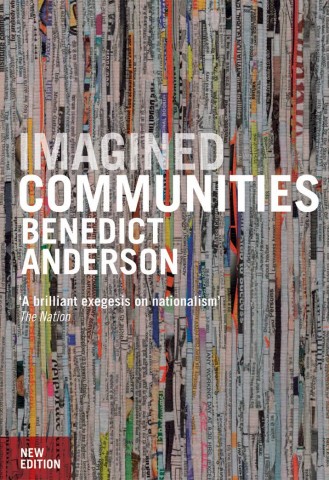Imagined Communities (1983) Anderson
Quotes from Anderson's book, an essential read for those interested in nations, nation-states and nationality:
The idea:
- "I propose the following definition of the nation: it is an imagined political community – and imagined as both inherently limited and sovereign." (5)
- "…it is an imagined as a community, because , regardless of the actual inequality and exploitation that may prevail in each, the nation is always conceived as a deep, horizontal comradeship. Ultimately it is this fraternity that makes it possible, over the past two centuries, for so many millions of people, not so much to kill, as willingly to die for such limited imaginings." (7)
- "since World War II every successful revolution has defined itself in national terms – the People's Republic of China, the Socialist Republic of Vietnam, and so forth – and, in doing so, has grounded itself firmly in a territorial and social space inherited from the prerevolutionary past." (2)
When and how did the nation-state and nationality-ism arise?
- "…the very possibility of imagining the nation only arose historically when, and where, three fundamental cultural conceptions, all of great antiquity, lost their axiomatic grip on men's minds. The first of these was the idea that a particular script-language offered privileged access to ontological truth, precisely because it was an inseparable part of that truth. It was this idea that called into being the great transcontinental sodalities of Christendom, the Islamic Ummah, and the rest. Second was the belief that society was naturally organized around and under high centers – monarchs who were persons apart from other human beings and who ruled by some form of cosmological (divine) dispensation. Human loyalties were necessarily hierarchical and centripetal because the ruler, like the sacred script, was a node of access to being and inherent in it. Third was a conception of temporality in which cosmology and history were indistinguishable, the origins of the world and of men essentially identical." (36)
Institutionalizing the nation:
- "Interlinked with one another, then, the census, the map and the museum illuminate the late colonial state's style of thinking about its domain. The 'warp' of this thinking was a totalizing classificatory grid, which could be applied with endless flexibility to anything under the state's real or contemplated control: peoples, regions, religions, languages, products, monuments, and so forth. The effect of the grid was always to be able to say of anything that is was this, not that; it belonged here, not there. It was bounded, determinate, and therefore – in principle – countable." (184)
Featured Posts
Tags
Food Security
Power
Ethiopia
Policy
Rural Development
Resilience
Islam
Culture
Democracy
Poverty
Education
Politics
decolonization
Books
Institutions
Inequality
Governance
Middle East
Land
Qatar
Development
South Africa
Anthropology
Civil society
Ethnography
Ideology
Participation
Racism
Migration
Revolution
Post-doc
International development
Conflict
Gender
Agriculture
Human Rights
Leadership
Africa
Colonialism
Interdisciplinary
Colonization
Fellowship
Sustainability
Economics
Climate change
Ethics
Development Studies
History
Globalization
Capitalism

